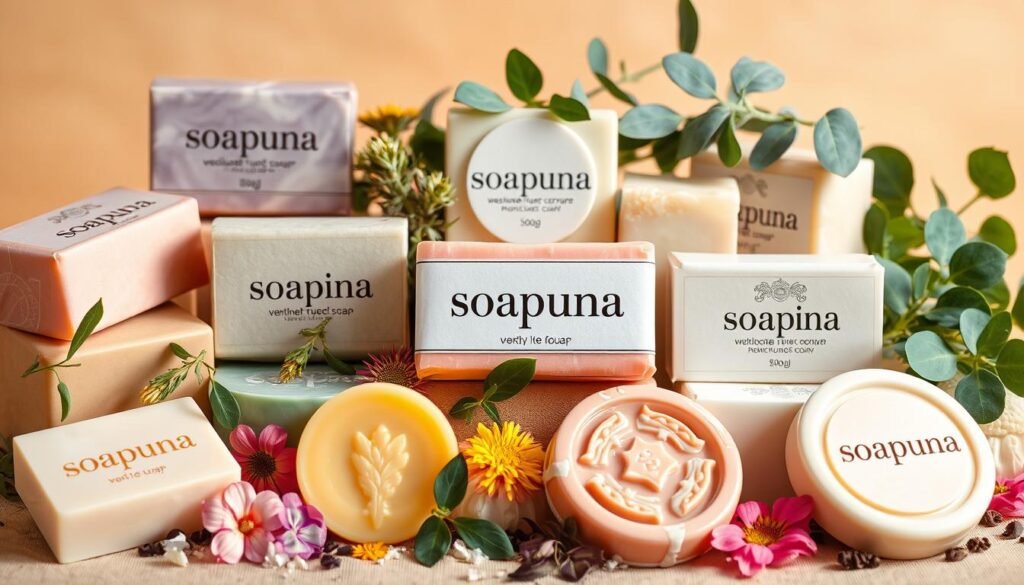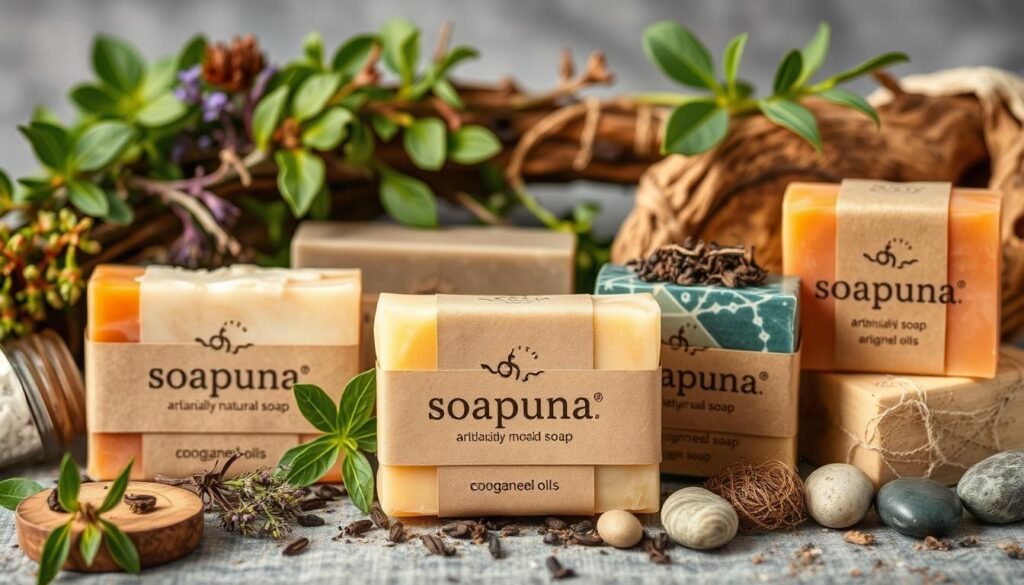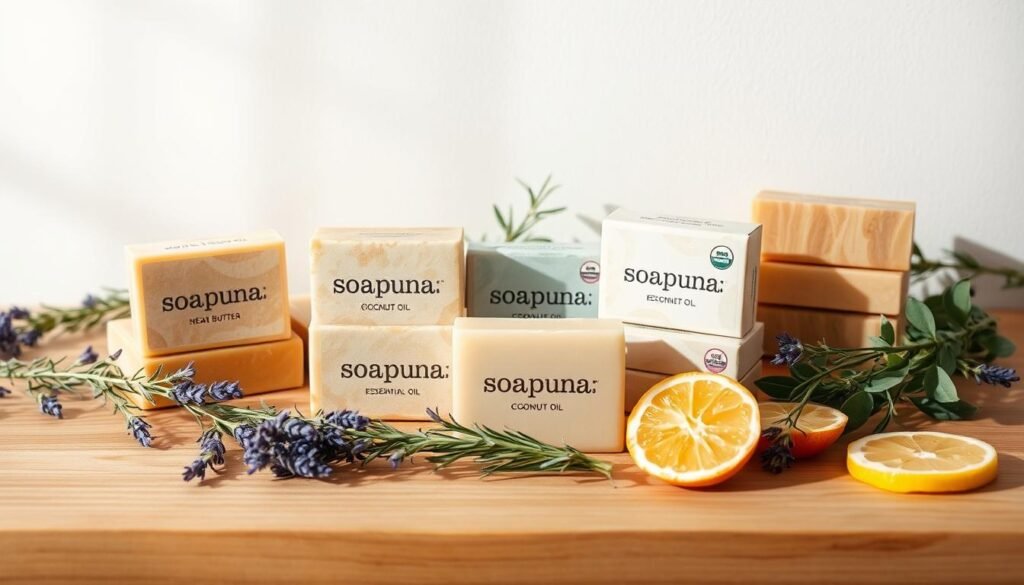Choosing the right store-bought soap is key for your skin health. Many people think bar soaps dry out the skin. But, new formulas make them gentle and effective.
Top rated soaps have more good stuff like fats and antioxidants. This means they can really help your skin.
We want to help you pick the best soap for your skin. We’ll talk to experts to guide you.
Key Takeaways
- Many bar soaps are now gentle and effective, making them a great option for those looking for popular store-bought soaps.
- Top rated store-bought soaps often contain more fats, antioxidants, and phenols compared to traditional formulations.
- Choosing the right store-bought soap can depend on your skin type and needs.
- Some commercial soaps may contain harsh ingredients that can irritate the skin.
- Handmade soaps made with natural ingredients can provide a 40% higher level of moisture retention compared to conventional commercial soaps.
- Approximately 45% of consumers switch to handmade soap after experiencing skin issues with commercial soaps.
Understanding the Basics of Store-Bought Soaps
Many of us choose affordable store-bought soaps from popular soap brands. But what makes a soap good for our skin? We’ll look into the basics of store-bought soaps and what makes a good one.
What Defines a Store-Bought Soap
A store-bought soap is known by its ingredients and use. The FDA says it must be mostly “alkali salts of fatty acids” to be called a soap. If it has synthetic detergents, it’s a cosmetic, not a soap.
Different Types of Commercial Soaps
There are many types of commercial soaps. These include bar soaps, liquid soaps, and body washes. Bar soap has been around for 2500 BC, but now, liquid soaps and body washes are more popular.
How Soap Affects Your Skin’s Natural Balance
The soap you use can change your skin’s natural balance. Effective store-bought soaps should be gentle yet clean well. Choose soaps with gentle, nourishing ingredients and avoid harsh chemicals that take away your skin’s natural oils.
The Truth About Popular Store-Bought Soaps and Your Skin
Many of us choose store-bought soaps for their ease and cost. Yet, we should think about how these soaps affect our skin. It’s key to pick quality store-bought soaps that are soft and nourishing. Some good options are Dove Beauty Bar, CeraVe Hydrating Cleanser Bar, and Panoxyl Bar Soap with 10% Benzoyl Peroxide.
These soaps often have harsh chemicals that take away our skin’s natural oils. This can make our skin dry and sore. On the other hand, quality store-bought soaps use natural ingredients that moisturize and protect. When looking to buy store-bought soaps, find ones without harsh chemicals and artificial scents.
Here are some tips for picking the best store-bought soaps for your skin:
- Read the ingredient label carefully
- Look for soaps that are fragrance-free or hypoallergenic
- Choose soaps that are made with natural ingredients

By carefully choosing recommended store-bought soaps, you can keep your skin healthy and moisturized. Always put your skin’s health first and pick quality store-bought soaps that are gentle and work well.
| Soap | Ingredients | Benefits |
|---|---|---|
| Dove Beauty Bar | Mild cleansers, moisturizers | Gentle, nourishing |
| CeraVe Hydrating Cleanser Bar | Hyaluronic acid, ceramides | Hydrating, protective |
| Panoxyl Bar Soap with 10% Benzoyl Peroxide | Benzoyl peroxide, glycerin | Acne-fighting, moisturizing |
Common Ingredients in Commercial Soaps
When looking for the best store-bought soaps, knowing what’s inside is key. Top soaps mix natural and synthetic stuff. Look for glycerin and shea butter for dry skin.
We aim to guide you in picking the right soap. We’ll show you how to read labels and understand what soap makers say. With expert tips, you’ll find soaps that are good for your skin.
Good ingredients in soaps include:
- Glycerin, which keeps skin moist
- Shea butter, full of vitamins A and E, makes skin elastic
- Natural oils, like coconut and olive oil, moisturize
But, some soaps have bad stuff like parabens, sulfates, and phthalates. These can harm your health. Choose soaps with natural, gentle ingredients to keep your skin healthy.
| Ingredient | Benefit |
|---|---|
| Glycerin | Retains moisture in the skin |
| Shea butter | Rich in vitamins A and E, improves skin elasticity |
| Natural oils | Provides moisturizing benefits |
How to Evaluate Store-Bought Soap Quality
Choosing affordable store-bought soaps means looking at a few key things. With many popular soap brands out there, picking the right one can be tough. Here are some important things to think about:
- Ingredients: Choose effective store-bought soaps with natural ingredients and no harsh chemicals.
- Processing methods: Cold-processed soaps are often better because they keep the ingredients’ quality.
- Price: While affordable store-bought soaps are tempting, very cheap ones might not be the best quality.
Brands like Dove, Seventh Generation, and CeraVe are known for their quality. When looking at effective store-bought soaps, think about the natural ingredients, emollients, and how well they clean.

By looking at these points and picking a trusted brand, you can find a good affordable store-bought soap. It will clean well and moisturize your skin.
| Brand | Price | Key Ingredients |
|---|---|---|
| Dove Nourishing Hand Wash | $3.49 | Almond oil, moisturizers |
| Seventh Generation Hand Wash | $3.99 | 97% biobased certified, natural ingredients |
| CeraVe Hydrating Cleanser Bar | $6 | Hyaluronic acid, ceramides |
The Impact of pH Levels in Commercial Soaps
When you buy store-bought soaps, think about the pH level. It’s key for your skin’s health. The best pH range is between 5.4 and 5.9, which is slightly acidic.
But, many soaps have a higher pH. This can dry out your skin. Studies show most soaps have a pH of 9-10, which is too high.
To find good soaps, look for ones with a pH close to your skin’s natural pH. You can use pH strips or ask a dermatologist. It’s important to pick soaps that are gentle and keep your skin balanced.
When checking a soap’s pH, consider a few things. Look at the ingredients, how it’s made, and its pH level. This helps you choose the right soap for your skin.
Remember, healthy skin needs balance. Using soaps with the right pH is a big step towards that balance.
Natural vs. Synthetic Ingredients in Store-Bought Soaps
Choosing the right store-bought soaps is key. Natural soaps use plant oils, essential oils, and organic stuff. They avoid harmful chemicals and preservatives. But, many commercial soaps have bad stuff like parabens, sulfates, and phthalates. These can harm your health, even cause cancer.
Top rated soaps often have natural stuff like coconut oil and shea butter. Natural ingredients are good for your skin. They’re also better for the planet than chemical soaps. More people are picking natural soaps because they care about health and the environment.
Here are some good things about natural soaps:
- They’re gentle on your skin because they’re made from plant oils and essential oils.
- They’re better for the planet because they break down easily.
- They keep your skin soft and moist because they have glycerin.
Using natural soaps is good for your skin and the planet. It means you’re avoiding harmful stuff and helping the environment. By picking natural soaps, you’re taking care of your skin and the earth.

Skin Types and Suitable Soap Selections
Choosing the right soap is key for your skin. We aim to guide you to the best soaps for your skin type. We’ve looked into many popular and affordable soaps to help you.
For dry skin, look for soaps with moisturizers like glycerin and hyaluronic acid. CeraVe Hydrating Cleanser Bar and Cetaphil Gentle Cleansing Bar are good choices. For oily skin, soaps with salicylic acid or benzoyl peroxide work well. Clinique Acne Solutions Cleansing Bar is a good pick.
Dry Skin Solutions
- CeraVe Hydrating Cleanser Bar: priced at $6 (25% off) at Amazon
- Cetaphil Gentle Cleansing Bar: priced at $9 at Amazon
Oily Skin Recommendations
- Clinique Acne Solutions Cleansing Bar: priced at $18 at Sephora
- Neutrogena Hydrating Facial Cleanser: priced at $10 at Walmart
Choosing the right soap is vital for a balanced skin care routine. Always check the ingredients. Look for natural ingredients and avoid harsh chemicals.
| Soap Brand | Price | Skin Type |
|---|---|---|
| CeraVe | $6 | Dry Skin |
| Clinique | $18 | Oily Skin |
| Dove | $7 | Sensitive Skin |
Alternative Options to Commercial Soaps
Many people choose to buy natural or organic soaps instead of commercial ones. It’s important to check the ingredients and quality of these soaps. Look for soaps with natural ingredients like plant-based oils and avoid harsh chemicals.
Some people like to make their own soap using natural ingredients. This way, they can control what goes into their soap. For those who prefer to buy, look for soaps with natural ingredients and minimal processing.
Natural Soap Alternatives
- Natural soaps typically contain plant-based oils like olive oil, coconut oil, and shea butter
- Shea butter is rich in vitamins A and E, essential for maintaining healthy skin
- Essential oils used in natural soaps, such as lavender and tea tree oil, have therapeutic properties

In conclusion, when looking for alternatives to commercial soaps, focus on ingredients and quality. Choose store-bought soaps with natural ingredients or make your own. This supports healthy skin and eco-friendly practices.
| Soap Type | Ingredients | Benefits |
|---|---|---|
| Natural Soap | Plant-based oils, essential oils | Gentle, natural, and therapeutic |
| Commercial Soap | Harsh chemicals, synthetic additives | Can be harsh, irritating, and damaging to skin |
How to Transition to Skin-Friendly Soap Options
Choosing the right soap is key for your skin. Look for soaps with natural ingredients. These are better for your skin than harsh chemicals.
Start by finding soaps without bad chemicals and artificial smells. These are good for your skin.
Look for soaps with natural oils like coconut oil and shea butter. They make your skin soft and healthy. Also, choose soaps without parabens and phthalates. These can dry out your skin and cause irritation.
Here are some tips to help you find a good soap:
- Read the ingredient label carefully and look for natural ingredients
- Avoid soaps with harsh chemicals and artificial fragrances
- Choose soaps that are paraben-free and phthalate-free
- Consider soaps with natural oils such as coconut oil, olive oil, and shea butter
Switching to a skin-friendly soap can make your skin healthier. Always check the ingredients for natural stuff. There are many great soaps out there, so you’ll find one that’s right for you.
| Soap Type | Ingredients | Benefits |
|---|---|---|
| Natural Soap | Coconut oil, olive oil, shea butter | Mild and moisturizing |
| Organic Soap | Paraben-free, phthalate-free | Gentle and non-irritating |
| Handmade Soap | Natural oils and fragrances | Unique and nourishing |
Best Practices for Using Store-Bought Soaps
When using affordable store-bought soaps, it’s key to follow best practices. This ensures you get the most from your soap and keep your skin healthy. Many grooming experts say using bar soap right can make showers better and cleaner.
Start by showering with warm water. Hot water can dry out your skin and make the soap last less time.
Using a washcloth or loofah can make lather better. This might cut down soap use by up to 20%. Also, popular soap brands often give tips on how to use their soaps right. They might suggest how often to use them.
To use your effective store-bought soaps well, here are some tips:
- Cut your bar soap into smaller pieces to make it last 15-30% longer.
- Don’t share bar soap with others. This can make it wear out faster and grow bacteria.
- Pick soaps with more oils and fats. They usually last longer.
By following these tips and picking the right affordable store-bought soaps for your skin, you can have healthy skin. And you’ll get the most out of your soap.
Conclusion: Making Informed Choices for Healthy Skin
Choosing the right store-bought soaps is key for healthy skin. Knowing what’s in them and how they affect your skin helps. This way, you pick the best recommended store-bought soaps for your skin type.
Going for natural or organic soaps is a good start. Or, pick quality store-bought soaps that are gentle. This keeps your skin healthy and balanced.
Your skin is huge and very important. What you put on it matters a lot. By picking the right store-bought soaps, you help your skin stay healthy and look great.
FAQ
Q: What defines a store-bought soap?
A: Store-bought soaps are made for sale in stores. They are not handmade. You can find many types for different skin needs.
Q: How do store-bought soaps affect the skin’s natural balance?
A: Some soaps can dry out and irritate your skin. This happens because of their ingredients and pH levels. Choosing the right soap is key to healthy skin.
Q: What are the pros and cons of using popular store-bought soaps?
A: Store-bought soaps are easy to find but can be harsh. Some have bad ingredients or wrong pH levels. Always check the ingredients for your skin type.
Q: What are the common beneficial and harmful ingredients in commercial soaps?
A: Good ingredients include moisturizers and antioxidants. Bad ones to avoid are harsh cleaners and fragrances. These can harm your skin’s balance.
Q: How can I evaluate the quality of a store-bought soap?
A: Look at the ingredients, how it’s made, pH level, and price. Reading expert reviews can also guide you.
Q: Why is the pH level of a soap important for skin health?
A: The pH level affects your skin’s acid mantle. Soaps with a pH of 5.5-8.0 are good. Higher pH levels can upset your skin.
Q: What are the differences between natural and synthetic ingredients in store-bought soaps?
A: Natural ingredients are often gentler. But, some synthetic ingredients can also be good for your skin. It depends on how they’re used.
Q: How can I choose the best store-bought soap for my skin type?
A: Think about your skin type and what it needs. Look for soaps made for your skin. A dermatologist can also help find the right one.
Q: What are some alternative options to commercial store-bought soaps?
A: Try natural soap bars, liquid castile soaps, or make your own. These can be gentler and more customizable.
Q: How can I transition to a skin-friendly store-bought soap option?
A: Start with a small amount and watch your skin. Choose soaps that are gentle and nourishing. This helps avoid skin problems.
Q: What are the best practices for using store-bought soaps effectively?
A: Use the soap right and not too much. Follow up with good skincare to keep your skin healthy and moist.
